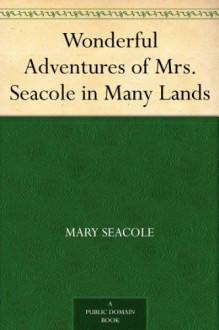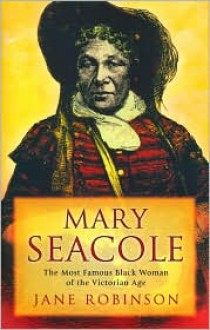
As opposed to the Boris Johnson thing I linked - this is the book I went looking for on Amazon. Because I'm lazy and don't want to hook my kindle up to the computer to transfer from Gutenberg - but here's that version. I should note that Gutenberg has illustrations, so I have that on my computer to refer to anyway:
Wonderful Adventures of Mrs. Seacole in Many Lands by Mary Seacole
This is yet another woman I'm studying in my continual project to learn more about women's history - because a single college class in women's studies just didn't complete my education. (Though it focused on African and African American authors, several of which I don't see mentioned most places, so it was epic for that. Someday I should post a list of the reading material - except I think we read some xerox'd bits as well.)
Best thing to do is refer you to her wikipedia page, because she's fascinating: Mary Seacole
"She acquired knowledge of herbal medicine in the Caribbean. When the Crimean War broke out, she applied to the War Office to assist but was refused. She travelled independently and set up her hotel and assisted battlefield wounded. She became extremely popular among service personnel who raised money for her when she faced destitution after the war.
After her death, she was forgotten for almost a century, but today is celebrated as a woman who successfully combatted racial prejudice. Her biography, Wonderful Adventures of Mrs. Seacole in Many Lands (1857), is one of the earliest autobiographies of a mixed-race woman, although some aspects of its accuracy have been questioned. It has been claimed that Seacole's achievements have been exaggerated for political reasons and a plan to erect a statue of her at St Thomas' Hospital, London, describing her as a "pioneer nurse", has generated controversy. Further controversy broke out in the United Kingdom late in 2012 over reports of a proposal to remove her from the country's National Curriculum."
My thoughts on this - it's not at all uncommon for books written by women to be heavily edited - or actually any books in that time period. The concept of editors hopping in and changing things up - sometimes dramatically rewriting huge portions - wasn't rare, it was what editors often did. And authors hated it and complained - and we have a lot of fun author letters because of it. (This is a continual source of Shakespearean scholarship, as printers made a lot of edits as well - but of course no Shakespearean complaint letters since he never saw his plays in print. Ah well.) Editing happened a lot (from what I've read anyway) on slave narratives which were published in the 1800s - language/grammar was tidied up, and there were claims that stories were exaggerated for melodramatic effect. (There are also plenty that are use sparce, plain language and are just as dramatic.) Of course some of those claims were from pro-slavery folk, so you have to weigh those sorts of remarks in context. Anyway, if we're going to toss out biographical works due to embellishment, there area LOT of books from the 1800s that're going away.
I should add here that there are always those who pop up to say "she didn't really write that book" (implied: some man wrote it for her) in the whole history of women writing books. So I always look to that sort of claim with skepticism, and see what sort of proof they have. (If a woman happens to be married to a man who's an author, this always happens. See Mary Shelley, Martha Gellhorn, etc. Oddly if a wife or daughter edits or transcribes for their author husband or father, they're only mentioned in an aside, because (snarky voice) of course they didn't write the work.)
The thing that fascinates me is the "controversy" in the idea that Seacole is somehow in competition with Florence Nightingale, known for her work in nursing and in the use of statistics to prove how better health care in the field could save lives. (Yes, a heroine of stats usage to prove a point. Cool, eh? I didn't learn that bit until grad school classes.) The two women have such dramatically different stories - saying there's a competition just because they're both nurses?! This is the kind of competition that seems entirely made up. Nightingale has been celebrated for a long time - and unfortunately turned into a meek stereotype of a lady nurse when she was definitely made of fiercer stuff. (They made her "safe." She wasn't. Women didn't try to prove men in power wrong using stats back then.) There's only a competition in this sort of history if you have the weird idea that only so many women's stories get to be told, that some stories are more important than others, and there's only so much space for this history at all. We need both Nightingale and Seacomb. And if there's any greater push to get Seacomb's story out now it's simply because we have a much larger group of white women that we hear/read about - and not as many of the women of color who get biographies and recognition. It's about time we heard more in an area where historical biographies are lacking - we need to have more books, statues, plaques, museum space, portraits on stamps, etc for women like Seacomb, and any women that haven't had their place in history recognized. It's not about comparison or judgement of who's more worthy - the whole "worthy" idea is why it's been a struggle to get any histories of women out there in the first place.
Here's where I add another rant - when you look up many famous women in hopes of finding biographical material and go to Amazon, what you'll often find are elementary/young reader books under 100 pages in length (often mostly taken up with artwork/illustration). I'd classify most of these books as fodder for age 9-12 - the facts are given, but the writing is simplistic. And those are often the only books available. You sometimes have to dig up history books from university presses (pricey, only in paper) or books from the 1800s to get any material at all (thank you Google books project). I don't have any numbers on how often this happens - but for the women I'm looking up it happens often. And this is problem because autobiographical material - and young reader books - need to have factual, well referenced history books that interested readers can turn to next if they want to learn more.
Anyway, I've got Seacomb's book next on my reading list, and thought I'd pass it on. It's only 120 pages - so a short read.

 Log in with Facebook
Log in with Facebook 







